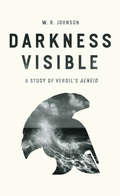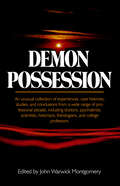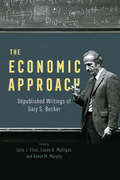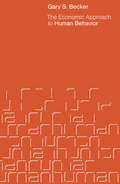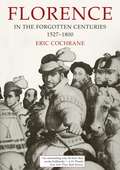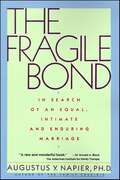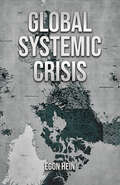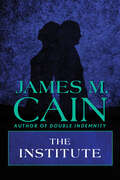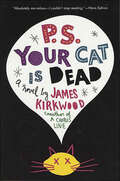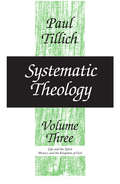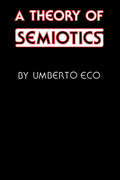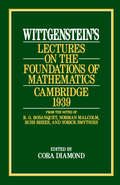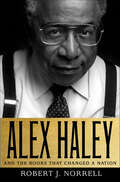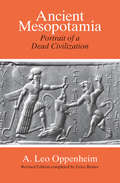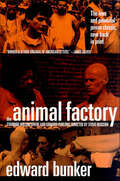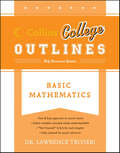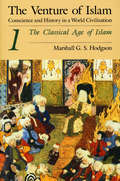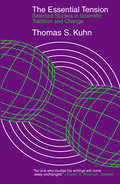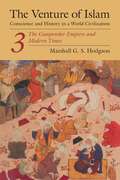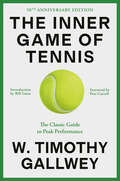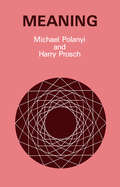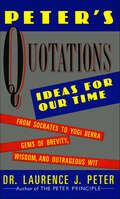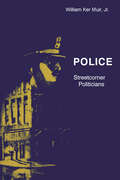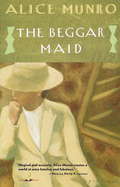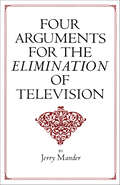- Table View
- List View
Darkness Visible: A Study of Vergil's "Aeneid"
by W.R. JohnsonOne of the best books ever written on one of humanity’s greatest epics, W. R. Johnson’s classic study of Vergil’s Aeneid challenges centuries of received wisdom. Johnson rejects the political and historical reading of the epic as a record of the glorious prehistory of Rome and instead foregrounds Vergil’s enigmatic style and questioning of the heroic myths. With an approach to the text that is both grounded in scholarship and intensely personal, and in a style both rhetorically elegant and passionate, Johnson offers readings of specific passages that are nuanced and suggestive as he focuses on the “somber and nourishing fictions” in Vergil’s poem. A timeless work of scholarship, Darkness Visible will enthrall classicists as well as students and scholars of the history of criticism—specifically the way in which politics influence modern readings of the classics—and of poetry and literature.
Demon Possession: Papers Presented at the University of Notre Dame
by John Warwick MontgomeryIn January of 1975, the Christian Medical Association gathered to deliver papers on the subject of demon possession. The essayists are Christians affiliated with a variety of academic institutions. The essays themselves explore the phenomena of the demonic in the Bible, in literature, on the mission field, in anthropology, legal history and psychiatric treatment. All of the participants accept the reality of the demonic but they are circumspect in their scholarship. If you are looking for a more substantial treatment than what you might find in popular booklets on the subject or on the fiction aisle, this is it; never before or since this symposium has there been a focused study of this magnitude on demon possession.
The Economic Approach: Unpublished Writings of Gary S. Becker
by Gary S. Becker Edward L. GlaeserA revealing collection from the intellectual titan whose work shaped the modern world.As an economist and public intellectual, Gary S. Becker was a giant. The recipient of a Nobel Prize, a John Bates Clark Medal, and a Presidential Medal of Freedom, Becker is widely regarded as the greatest microeconomist in history.After forty years at the University of Chicago, Becker left a slew of unpublished writings that used an economic approach to human behavior, analyzing such topics as preference formation, rational indoctrination, income inequality, drugs and addiction, and the economics of family.These papers unveil the process and personality—direct, critical, curious—that made him a beloved figure in his field and beyond. The Economic Approach examines these extant works as a capstone to the Becker oeuvre—not because the works are perfect, but because they offer an illuminating, instructive glimpse into the machinations of an economist who wasn’t motivated by publications. Here, and throughout his works, an inquisitive spirit remains remarkable and forever resonant.
The Economic Approach to Human Behavior
by Gary S. BeckerSince his pioneering application of economic analysis to racial discrimination, Gary S. Becker has shown that an economic approach can provide a unified framework for understanding all human behavior. In a highly readable selection of essays Becker applies this approach to various aspects of human activity, including social interactions; crime and punishment; marriage, fertility, and the family; and "irrational" behavior. "Becker's highly regarded work in economics is most notable in the imaginative application of 'the economic approach' to a surprising breadth of human activity. Becker's essays over the years have inevitably inspired a surge of research activity in testimony to the richness of his insights into human activities lying 'outside' the traditionally conceived economic markets. Perhaps no economist in our time has contributed more to expanding the area of interest to economists than Becker, and a number of these thought-provoking essays are collected in this book."—Choice Gary Becker was awarded the Nobel Prize in Economic Science in 1992.
Florence in the Forgotten Centuries, 1527–1800: A History of Florence and the Florentines in the Age of the Grand Dukes
by Eric CochraneThe city of Florence has long been admired as the home of the brilliant artistic and literary achievement of the early Renaissance. But most histories of Florence go no further than the first decades of the sixteenth century. They thus give the impression that Florentine culture suddenly died with the generation of Leonardo, Machiavelli, and Andrea del Sarto. Eric Cochrane shows that the Florentines maintained their creativity long after they had lost their position as the cultural leaders of Europe. When their political philosophy and historiography ran dry, they turned to the practical problems of civil administration. When their artists finally yielded to outside influence, they turned to music and the natural sciences. Even during the darkest days of the great economic depression of the late seventeenth and early eighteenth centuries, they succeeded in preserving—almost alone in Europe—the blessings of external peace and domestic tranquility.
The Fragile Bond: In Search of an Equal, Intimate and Enduring Marriage
by Augustus Y. NapierFocusing on the author's own marriage and on a group of case studies, this book vividly illustrates the obstacles married couples face today and offers help in overcoming them.
Global Systemic Crisis
by Egon HeinOur world has transformed over recent decades with concerning trends that threaten to destabilize nation states, abolish society and culture, establish digital control over individuals, erase identity, and diminish what makes us human. While the economic crisis garners attention, today’s crisis encompasses much more – politics, civil society, science, philosophy, education, art, religion, traditional values, and other facets of life. This signals a systemic crisis of modern global capitalism. This book surveys today’s pivotal trends, contrasting the dying old world with the emerging new one including their social systems, social sciences, and conceptions of humanity. Drawing on extensive research, it features interviews and lectures by prominent yet little-known thinkers, especially for English readers. Of particular value, the work synthesizes insights from diverse domains – news, scientific and monographic articles, video lectures, films, and manga. The copious footnotes and bibliography constitute a significant portion of the text, providing sources for further investigation. Overall, this book aims to furnish keys to analysing today’s interwoven crises, serving as a guidebook for comprehending the contemporary age holistically. It empowers readers to conduct their own inquiries into this crucial juncture that will shape the future. Sure to intrigue even those less versed in the subject matter.
The Institute
by James M. CainAn academic looking for money finds a seductive woman—and trouble—in this suspenseful tale by the Edgar Award–winning crime writer.Professor Lloyd Palmer loves a good biography. His fantasy is to start an institute to teach young scholars the biographical arts, and it will take old money to make his dreams come true. In the Washington area, the oldest money is found not in the District, but in Delaware, a land of wealth so astonishing that even the Du Ponts are considered nouveau riche. But when Professor Palmer goes to Wilmington, he comes away not with old money, but young trouble by the name of Hortense Garrett. She is his benefactor’s wife, a twenty-something beauty trapped in an unhappy marriage, whose good looks conceal the most cunning mind on this side of the Potomac. She needs a ride to Washington, and Lloyd offers to give her a lift. They’ve barely left Delaware before he falls for her. By the time the pair hits the beltway, the ending of his biography will be in her hands.Praise for James M. Cain’s fiction“Lean, racing . . . stripped of inessentials.” —The New York Times“Nobody has quite pulled it off the way Cain does . . . not even Raymond Chandler.” —Tom Wolfe
P.S. Your Cat Is Dead: A Novel
by James KirkwoodIt's New Year's Eve in New York City. Your best friend died in September, you've been robbed twice, your girlfriend is leaving you, you've lost your job...and the only one left to talk to is the gay burglar you've got tied up in the kitchen... P.S. your cat is dead.An instant classic upon its initial publication, P.S. Your Cat is Dead received widespread critical acclaim and near fanatical reader devotion. The stage version of the novel was equally successful and there are still over 200 new productions of it staged every year. Now, for the first time in a decade, James Kirkwood's much-loved black humor comic novel of manners and escalating disaster returns to bewitch and beguile a new generation.
Systematic Theology: Life and the Spirit History and the Kingdom of God
by Paul TillichIn this volume, the third and last of his Systematic Theology, Paul Tillich sets forth his ideas of the meaning of human life, the doctrine of the Spirit and the church, the trinitarian symbols, the relation of history to the Kingdom of God, and the eschatological symbols. He handles this subject matter with powerful conceptual ability and intellectual grace. The problem of life is ambiguity. Every process of life has its contrast within itself, thus driving man to the quest for unambiguous life or life under the impact of the Spritual Presence. The Spritual Presence conquers the negativities of religion, culture, and morality, and the symbols anticipating Eternal Life present the answer to the problem of life.
A Theory of Semiotics (Advances in Semiotics)
by Umberto Eco" . . . the greatest contribution to [semiotics] since the pioneering work of C. S. Peirce and Charles Morris." —Journal of Aesthetics and Art Criticism" . . . draws on philosophy, linguistics, sociology, anthropology and aesthetics and refers to a wide range of scholarship . . . raises many fascinating questions." —Language in Society" . . . a major contribution to the field of semiotic studies." —Robert Scholes, Journal of Aesthetics and Art Criticism" . . . the most significant text on the subject published in the English language that I know of." —Arthur Asa Berger, Journal of CommunicationEco's treatment demonstrates his mastery of the field of semiotics. It focuses on the twin problems of the doctrine of signs—communication and signification—and offers a highly original theory of sign production, including a carefully wrought typology of signs and modes of production.
Wittgenstein's Lectures on the Foundations of Mathematics, Cambridge, 1939
by Cora DiamondFor several terms at Cambridge in 1939, Ludwig Wittgenstein lectured on the philosophical foundations of mathematics. A lecture class taught by Wittgenstein, however, hardly resembled a lecture. He sat on a chair in the middle of the room, with some of the class sitting in chairs, some on the floor. He never used notes. He paused frequently, sometimes for several minutes, while he puzzled out a problem. He often asked his listeners questions and reacted to their replies. Many meetings were largely conversation. These lectures were attended by, among others, D. A. T. Gasking, J. N. Findlay, Stephen Toulmin, Alan Turing, G. H. von Wright, R. G. Bosanquet, Norman Malcolm, Rush Rhees, and Yorick Smythies. Notes taken by these last four are the basis for the thirty-one lectures in this book. The lectures covered such topics as the nature of mathematics, the distinctions between mathematical and everyday languages, the truth of mathematical propositions, consistency and contradiction in formal systems, the logicism of Frege and Russell, Platonism, identity, negation, and necessary truth. The mathematical examples used are nearly always elementary.
Alex Haley and the Books That Changed a Nation
by Robert J. NorrellIt is difficult to think of two twentieth century books by one author that have had as much influence on American culture when they were published as Alex Haley's monumental bestsellers, The Autobiography of Malcolm X (1965), and Roots (1976). They changed the way white and black America viewed each other and the country's history. This first biography of Haley follows him from his childhood in relative privilege in deeply segregated small town Tennessee to fame and fortune in high powered New York City. It was in the Navy, that Haley discovered himself as a writer, which eventually led his rise as a star journalist in the heyday of magazine personality profiles. At Playboy Magazine, Haley profiled everyone from Martin Luther King and Miles Davis to Johnny Carson and Malcolm X, leading to their collaboration on The Autobiography of Malcolm X. Roots was for Haley a deeper, more personal reach. The subsequent book and miniseries ignited an ongoing craze for family history, and made Haley one of the most famous writers in the country. Roots sold half a million copies in the first two months of publication, and the original television miniseries was viewed by 130 million people. Haley died in 1992. This deeply researched and compelling book by Robert J. Norrell offers the perfect opportunity to revisit his authorship, his career as one of the first African American star journalists, as well as an especially dramatic time of change in American history.
Ancient Mesopotamia: Portrait of a Dead Civilization
by A. Leo Oppenheim"This splendid work of scholarship . . . sums up with economy and power all that the written record so far deciphered has to tell about the ancient and complementary civilizations of Babylon and Assyria."—Edward B. Garside, New York Times Book Review Ancient Mesopotamia—the area now called Iraq—has received less attention than ancient Egypt and other long-extinct and more spectacular civilizations. But numerous small clay tablets buried in the desert soil for thousands of years make it possible for us to know more about the people of ancient Mesopotamia than any other land in the early Near East. Professor Oppenheim, who studied these tablets for more than thirty years, used his intimate knowledge of long-dead languages to put together a distinctively personal picture of the Mesopotamians of some three thousand years ago. Following Oppenheim's death, Erica Reiner used the author's outline to complete the revisions he had begun. "To any serious student of Mesopotamian civilization, this is one of the most valuable books ever written."—Leonard Cottrell, Book Week "Leo Oppenheim has made a bold, brave, pioneering attempt to present a synthesis of the vast mass of philological and archaeological data that have accumulated over the past hundred years in the field of Assyriological research."—Samuel Noah Kramer, Archaeology A. Leo Oppenheim, one of the most distinguished Assyriologists of our time, was editor in charge of the Assyrian Dictionary of the Oriental Institute and John A. Wilson Professor of Oriental Studies at the University of Chicago.
The Animal Factory: A Novel
by Edward BunkerThe Animal Factory goes deep into San Quentin, a world of violence and paranoia, where territory and status are ever-changing and possibly fatal commodities. Ron Decker is a newbie, a drug dealer whose shot at a short two-year stint in the can is threatened from inside and outside. He's got to keep a spotless record or it's ten to life. But at San Quentin, no man can steer clear of the Brotherhoods, the race wars, the relentlessness. It soon becomes clear that some inmates are more equal than others; Earl Copen is one of them, an old-timer who has learned not just to survive but to thrive behind bars. Not much can surprise him-but the bond he forms with Ron startles them both; it's a true education of a felon.
Basic Mathematics (Collins College Outlines)
by Lawrence A. TrivieriMaster Your Coursework with Collins College OutlinesFrom fraions, decimals, and geometric measurement to exponents, scientific notation, and an introduion to algebra, the Collins College Outline in Basic Mathematics explores and explains the topics that students will find in introduory mathematics classes. Completely revised and updated by Dr. Lawrence Trivieri, Basic Mathematics includes a test yourself seion with answers and complete explanations at the end of each chapter. Also included are bibliographies for further reading, as well as numerous graphs, charts, and example problems.The Collins College Outlines are a completely revised, in-depth series of study guides for all areas of study, including the Humanities, Social Sciences, Mathematics, Science, Language, History, and Business. Featuring the most up-to-date information, each book is written by a seasoned professor in the field and focuses on a simplified and general overview of the subje for college students and, where appropriate, Advanced Placement students. Each Collins College Outline is fully integrated with the major curriculum for its subje and is a perfe supplement for any standard textbook.
The Classical Age of Islam: The Classical Age Of Islam (The Venture of Islam: Conscience and History in a World Civilization)
by Marshall G.S. HodgsonThe Venture of Islam has been honored as a magisterial work of the mind since its publication in early 1975. In this three-volume study, illustrated with charts and maps, Hodgson traces and interprets the historical development of Islamic civilization from before the birth of Muhammad to the middle of the twentieth century. This work grew out of the famous course on Islamic civilization that Hodgson created and taught for many years at the University of Chicago. "This is a nonpareil work, not only because of its command of its subject but also because it demonstrates how, ideally, history should be written."—The New Yorker Volume 1, The Classical Age of Islam, analyzes the world before Islam, Muhammad's challenge, and the early Muslim state between 625 and 692. Hodgson then discusses the classical civilization of the High Caliphate. The volume also contains a general introduction to the complete work and a foreword by Reuben Smith, who, as Hodgson's colleague and friend, finished the Venture of Islam after the author's death and saw it through to publication.
The Essential Tension: Selected Studies in Scientific Tradition and Change
by Thomas S. Kuhn"Kuhn has the unmistakable address of a man, who, so far from wanting to score points, is anxious above all else to get at the truth of matters."—Sir Peter Medawar, Nature
The Gunpowder Empires and Modern Times: The Gunpowder Empires And Modern Times (The Venture of Islam: Conscience and History in a World Civilization)
by Marshall G.S. HodgsonThe Venture of Islam has been honored as a magisterial work of the mind since its publication in early 1975. In this three-volume study, illustrated with charts and maps, Hodgson traces and interprets the historical development of Islamic civilization from before the birth of Muhammad to the middle of the twentieth century. This work grew out of the famous course on Islamic civilization that Hodgson created and taught for many years at the University of Chicago. In this concluding volume of The Venture of Islam, Hodgson describes the second flowering of Islam: the Safavi, Timuri, and Ottoman empires. The final part of the volume analyzes the widespread Islamic heritage in today's world. "This is a nonpareil work, not only because of its command of its subject but also because it demonstrates how, ideally, history should be written."—The New Yorker
The Inner Game of Tennis: The Classic Guide to the Mental Side of Peak Performance
by W. Timothy GallweyThe timeless guide to achieving the state of &“relaxed concentration&” that&’s not only the key to peak performance in tennis but the secret to success in life itself—part of the bestselling Inner Game series, with more than one million copies sold!&“Groundbreaking . . . the best guide to getting out of your own way . . . Its profound advice applies to many other parts of life.&”—Bill Gates, GatesNotes (&“Five of My All-Time Favorite Books&”) This phenomenally successful guide to mastering the game from the inside out has become a touchstone for hundreds of thousands of people. Billie Jean King has called the book her tennis bible; Al Gore has used it to focus his campaign staff; and Itzhak Perlman has recommended it to young violinists. Based on W. Timothy Gallwey&’s profound realization that the key to success doesn&’t lie in holding the racket just right, or positioning the feet perfectly, but rather in keeping the mind uncluttered, this transformative book gives you the tools to unlock the potential that you&’ve possessed all along. &“The Inner Game&” is the one played within the mind of the player, against the hurdles of self-doubt, nervousness, and lapses in concentration. Gallwey shows us how to overcome these obstacles by trusting the intuitive wisdom of our bodies and achieving a state of &“relaxed concentration.&” With chapters devoted to trusting the self and changing habits, it is no surprise then, that Gallwey&’s method has had an impact far beyond the confines of the tennis court. Whether you want to play music, write a novel, get ahead at work, or simply unwind after a stressful day, Gallwey shows you how to tap into your utmost potential. No matter your goals, The Inner Game of Tennis gives you the definitive framework for long-term success.
Meaning
by Michael Polanyi Harry ProschPublished very shortly before his death in February 1976, Meaning is the culmination of Michael Polanyi's philosophic endeavors. With the assistance of Harry Prosch, Polanyi goes beyond his earlier critique of scientific "objectivity" to investigate meaning as founded upon the imaginative and creative faculties. Establishing that science is an inherently normative form of knowledge and that society gives meaning to science instead of being given the "truth" by science, Polanyi contends here that the foundation of meaning is the creative imagination. Largely through metaphorical expression in poetry, art, myth, and religion, the imagination is used to synthesize the otherwise chaotic and disparate elements of life. To Polanyi these integrations stand with those of science as equally valid modes of knowledge. He hopes this view of the foundation of meaning will restore validity to the traditional ideas that were undercut by modern science. Polanyi also outlines the general conditions of a free society that encourage varied approaches to truth, and includes an illuminating discussion of how to restore, to modern minds, the possibility for the acceptance of religion.
Peter's Quotations: Ideas for Our Times
by Laurence J. PeterFrom the author of the multimillion-selling The Peter Principle, and The Peter Prescription, here is a timeless collection of some of history's greatest and best-expressed thoughts. Organized alphabetically by subject -- from Ability to Zoos -- and completely cross-refernced by related categories, Peter's Quotations is a joy to use. Packed with many unusual and little-known quotations of great wit, Dr. Peter's reference book is not only fun to read -- an idea mine for writers, students, and public speakers -- but it is also relevant to the sometimes overwhelming problems of today. Peter's Quotations is priceless.
Police: Streetcorner Politicians
by William K. Muir Jr."This book . . . examines the problem of police corruption . . . in such a way that the stereotype of the crude, greedy cop who is basically a grown-up delinquent, if not an out-and-out robber, yields to portraits of particular men, often of earnest good will and even more than ordinary compassion, contending with an enormously demanding and challenging job."—Robert Coles, New Yorker "Other social scientists have observed policemen on patrol, or have interviewed them systematically. Professor Muir has brought the two together, and, because of the philosophical depth he brings to his commentaries, he has lifted the sociology of the police on to a new level. He has both observed the men and talked with them at length about their personal lives, their conceptions of society and of the place of criminals within it. His ambition is to define the good policeman and to explain his development, but his achievement is to illuminate the philosophical and occupational maturation of patrol officers in 'Laconia' (a pseudonym) . . . . His discussions of [the policemen's] moral development are threaded through with analytically suggestive formulations that bespeak a wisdom very rarely encountered in reports of sociological research."—Michael Banton, Times Literary Supplement
The Beggar Maid: Stories of Flo and Rose (Vintage International)
by Alice Munro&“An exhilarating collection&” (The New York Times Book Review) of ten blended stories from Nobel Prize–winning author Alice Munro &“The rich texture of its narrative and the author&’s graceful style make [The Beggar Maid] a considerable accomplishment.&”—Joyce Carol Oates, Ms. In this vibrant series of interweaving stories, Alice Munro recreates the evolving bond—one that is both constricting and empowering—between two women in the course of almost forty years. One is Flo, practical, suspicious of other people&’s airs, at times dismayingly vulgar. The other is Rose, Flo&’s stepdaughter, a clumsy, shy girl who somehow—in spite of Flo&’s ridicule and ghastly warnings—leaves the small town she grew up in to achieve her own equivocal success in the larger world.
Four Arguments for the Elimination of Television
by Jerry ManderA total departure from previous writing about television, this book is the first ever to advocate that the medium is not reformable. Its problems are inherent in the technology itself and are so dangerous—to personal health and sanity, to the environment, and to democratic processes—that TV ought to be eliminated forever.Weaving personal experiences through meticulous research, the author ranges widely over aspects of television that have rarely been examined and never before joined together, allowing an entirely new, frightening image to emerge. The idea that all technologies are "neutral," benign instruments that can be used well or badly, is thrown open to profound doubt. Speaking of TV reform is, in the words of the author, "as absurd as speaking of the reform of a technology such as guns."
